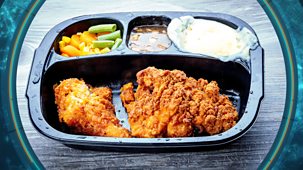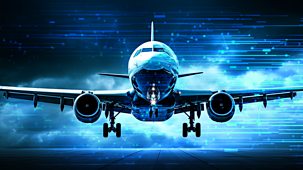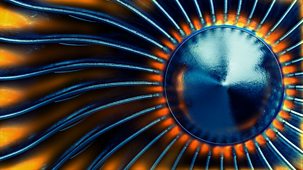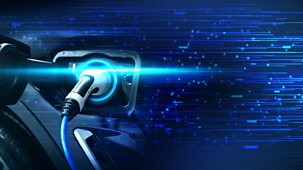Ready Meals
The food we eat comes at a cost to the planet. Our food generates more than a quarter of the UK's carbon emissions. That means what we eat and how it is produced must change if the country is to hit net zero. But what will it take, and can we stomach it?\n\nBBC climate editor Justin Rowlatt, presenter Michelle Ackerley and scientist Fran Scott investigate how one of the UK’s most popular food products is made. They explore all stages of a ready meal's life – from farming to manufacturing, processing to packaging, and distribution to waste. And they test potential solutions to see if it's possible to produce food and make ready meals using greener technologies.\n\nJustin makes his own ready meal to test the latest technology, discovering the practicalities of producing low-carbon food. He visits a vast supermarket distribution centre to find out how they keep it cool and questions what Tesco is doing to reduce its environmental impact. Justin also goes to a farm to explore the challenges of growing crops and raising cattle, and asks whether we need to eat less meat. He also finds out how growing our food affects climate change.\n\nMichelle investigates whether palm oil could be replaced by a process similar to brewing beer. She finds out how they do it and the scale of the challenge involved in replacing this essential ready meal ingredient. She also meets the scientists who are trying to make plant-based meat alternatives taste better by using a novel ingredient yet to be approved for human consumption.\n\nFran meets the high-tech robot that could transform how we cook on an industrial scale. She finds out why it makes it much easier to clean pots and what that means for reducing greenhouse gases. She investigates a new method to produce a bio-fertiliser to see if it can replace the millions of tonnes of artificial fertiliser used on our fields. Fran also joins a bin round to collect food waste and finds out where it all goes to see if there is a better way to manage its impact.
Source: BBC 1
Most recent episodes of What They Really Mean for You
What They Really Mean For You
Ready Meals
The food we eat comes at a cost to the planet. Our food generates more than a quarter of the UK's carbon emissions. That means what we eat and how it is produced must change if ...
05-04-2025
BBC 1
What They Really Mean For You
Cheap Flights
Holidays abroad are an essential part of life for many of us. Cheap flights have helped millions of us travel to the sun. But the planes we fly on emit huge amounts of greenhous ...
28-11-2024
BBC 1
What They Really Mean For You
Series 1: 2. Heat Pumps
How we heat our homes is set to radically change as the government phases out gas boilers. But can changing the technology we use every day help us reduce greenhouse gases and s ...
17-08-2023
BBC 1
What They Really Mean For You
Series 1: 1. Electric Cars
Cars are an essential part of life for many of us. But new petrol and diesel cars will be banned from sale in 2030 to help reduce greenhouse gas emissions. Electric cars are sel ...
10-08-2023
BBC 1
Most popular episodes of What They Really Mean for You
What They Really Mean For You
Ready Meals
The food we eat comes at a cost to the planet. Our food generates more than a quarter of the UK's carbon emissions. That means what we eat and how it is produced must change if ...
05-04-2025
BBC 1
What They Really Mean For You
Cheap Flights
Holidays abroad are an essential part of life for many of us. Cheap flights have helped millions of us travel to the sun. But the planes we fly on emit huge amounts of greenhous ...
28-11-2024
BBC 1
What They Really Mean For You
Series 1: 1. Electric Cars
Cars are an essential part of life for many of us. But new petrol and diesel cars will be banned from sale in 2030 to help reduce greenhouse gas emissions. Electric cars are sel ...
10-08-2023
BBC 1
What They Really Mean For You
Series 1: 2. Heat Pumps
How we heat our homes is set to radically change as the government phases out gas boilers. But can changing the technology we use every day help us reduce greenhouse gases and s ...
17-08-2023
BBC 1





